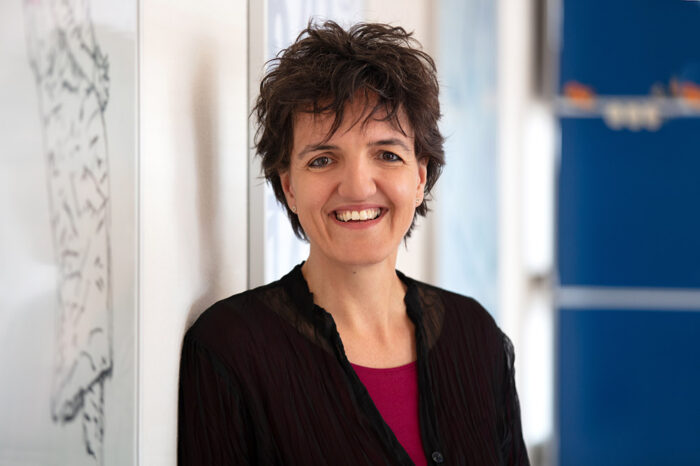
At 11am (BST) on Monday 30th September, Silvia Arber will deliver the 2024 Francis Crick Lecture, ‘Neuronal circuits for body movements’. The lecture will be delivered in the LMB’s Max Perutz Lecture Theatre and anyone interested is warmly invited to attend; if you are not at the LMB and wish to attend a seminar, please contact the seminar secretary.
Silvia Arber is a Professor for Neurobiology and Cell Biology at the Biozentrum Center for Molecular Life Sciences at the University of Basel, and a Senior Group Leader at the Friedrich Miescher Institute for Biomedical Research (FMI) in Switzerland. Here, she leads research into motor circuit function. Prior to this, she received B.Sc. and Ph.D. degrees from the University of Basel, and completed postdoctoral studies at Columbia University, New York.
Silvia’s group is interested in understanding the principles by which neuronal circuits orchestrate accurate and timely control of movement. Using multi-faceted approaches combining many technologies, they study nervous-system-wide neuronal circuits involved in motor control, including how brain circuits interact with executive spinal circuits to produce body movements. Recent work has focused on the motor brainstem to unravel the identity of circuits at the intersection between planning and execution. The work also aims to discover mechanisms involved in circuit plasticity during motor learning and in response to disease or injury.
Silvia’s research has previously been recognised with numerous awards, including the Grand Prix Charles-Léopold Mayer from the French Academy of Sciences in 2019, and the prestigious Brain Prize from the Lundbeck Foundation in 2021. She was elected to EMBO in 2005 and the American National Academy of Sciences in 2020.
Lecture abstract
Movement is the behavioural output of the nervous system. This lecture will focus on recent work elucidating the organisation and function of neuronal circuits central to the regulation of distinct forms of body movements, including locomotion and skilled forelimb movements. It will show that dedicated circuit modules in different regions of the brainstem and their interactions within the motor system play key roles in the generation of diverse actions.
Background information
The Francis Crick Lecture is given in honour of LMB alumnus and Nobel Laureate Francis Crick. It is one of a series of named lectures organised by the LMB given be eminent scientists from around the world. These talks are supported by AstraZeneca and the Max Perutz Fund.
Francis Crick was born in Northampton in 1916. He received a B.Sc. in Physics from University College London in 1937. His subsequent Ph.D. studies were interrupted by World War II, during which he worked on the design of acoustic and magnetic mines for the British Admiralty. In 1948 he joined Max Perutz’s MRC Unit for Research on the Molecular Structure of Biological Systems (renamed the MRC Laboratory of Molecular Biology in 1962). It was here that he helped solve the structure of DNA and initiated work on the genetic code. In 1976 he moved to the Salk Institute in California where he immersed himself in trying to define how we are aware of things, looking to find a neuronal correlate of consciousness. He continued with this until his death in San Diego on 28th July 2004.
Further references
Silvia Arber’s Biozentrum group page
Silvia Arber’s FMI group page
Francis Crick Biography
LMB Named Lectures